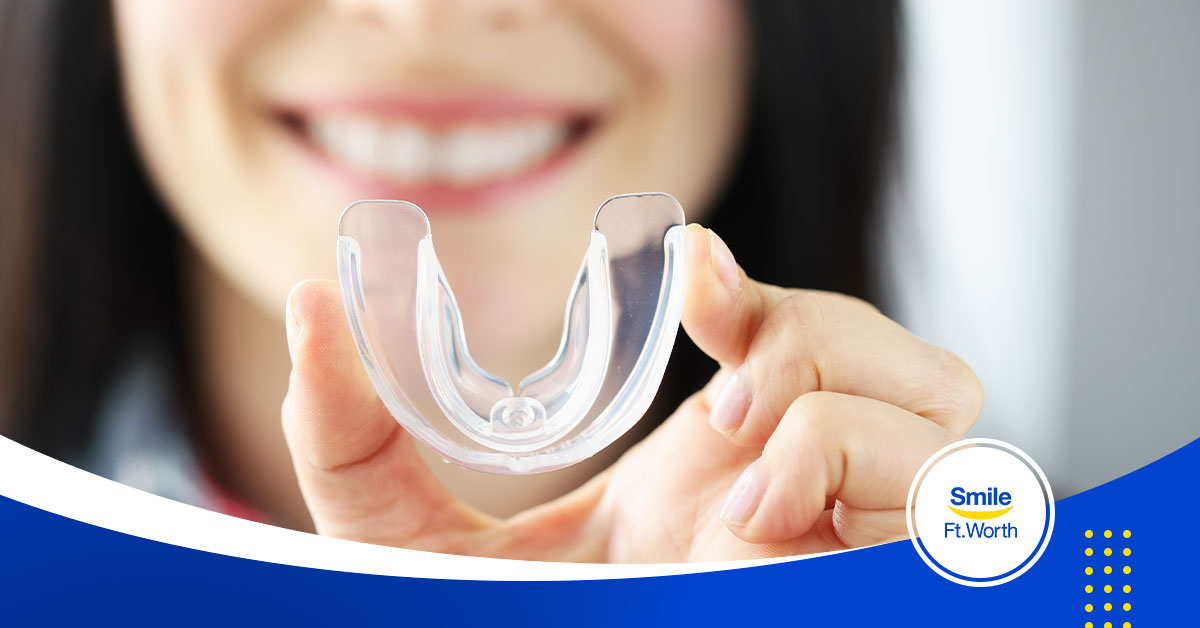Have you ever woken up and immediately felt a headache? Maybe you’ve noticed your jaw’s a little achy lately. Or, your partner keeps complaining that they can’t get any sleep because they hear your teeth grinding every night. Perhaps you’ve even suddenly chipped a tooth and you have no reason why. If some or all of these scenarios sound familiar, it may be time to speak with a Fort Worth dentist about a night guard.
But what exactly is a night guard? And how do they work? Keep on reading to see how this retainer-like device can save your smile and lead to a more pleasant, less painful morning.
What Is a Night Guard?
Have you ever seen one of those teeth whitening trays? Or, those protective mouth guards the athletes use? Well, that’s essentially what a night guard looks like. You might occasionally hear your Fort Worth dentist refer to night guards as an occlusal splint, occlusal guard, bite guard, or bite splint. Whatever your dental practitioner calls it, a night guard is designed to do one thing: protect your teeth from the damaging effects of clenching or grinding (aka bruxism) during your sleep.
Night Guards Offer Protection From Bruxism AKA Teeth Grinding
Night guards are designed to protect your teeth against bruxism, a condition in which you abnormally grind your teeth or clench your jaw. There are two types of bruxism:
- Diurnal bruxism: Grinding your teeth while awake.
- Nocturnal bruxism: Grinding your teeth while you’re asleep.
Out of the two types of bruxism, sleep grinding is much harder to treat since you can’t stop yourself from doing it while you are unconscious. Regardless of whether you’re clenching during the night or day, bruxism is a pesky habit that comes with a lot of adverse side effects. For one, there’s the pain. After grinding your teeth, you might experience headaches, facial pain, or jaw pain. Bruxism can even lead to temporomandibular joint disorder (known as TMJ)—a debilitating condition that occurs when the jaw joint is misaligned.
But, it’s not just headaches and soreness you have to worry about. When you grind your teeth, you can bite down with up to 250 pounds of force. So it’s no surprise that it can wear down, chip, or even break teeth, all of which can lead to serious oral issues, including loss of enamel, sensitivity, and an increased chance of tooth decay.
This is where an occlusal guard saves the day (or, night more often). Typically worn while sleeping, night guards relax the jaw and prevent damage by providing a protective barrier that gives your teeth something to grind on other than your teeth.
How Do I Know If I Need a Night Guard?
Many people aren’t aware that they’re grinding their teeth, even when they’re awake. That’s why it’s important to understand the telltale signs of bruxism, so you can schedule an appointment with your Fort Worth dentist to address the issue.
Here are some signs of bruxism that might indicate it’s time for a night guard:
- Unexplained damage to your teeth, like chipping or fracturing
- Tension-type headaches, especially after waking up
- Tooth, jaw, or facial pain
- You suffer from sleep disruption
- Your bed partner notices a grinding sound while you’re asleep
- Clicking and popping sounds when you open your mouth
- You’re having difficulty chewing, as though your upper and lower teeth aren’t fitting together properly
- Soreness or damage from chewing on the inside of your cheek
Even if you’re not quite sure if you suffer from these issues, it’s a good idea to visit your local Fort Worth dentist at least every six months for a routine checkup, as they may identify any signs of bruxism during one of these check-ins.
Custom Night Guards Vs Over-The-Counter Night Guards
For teeth grinders, there are two preventative options: over-the-counter night guards or custom night guards designed by your local Fort Worth dentist. Although over-the-counter night guards are tempting because they’re easily accessible and often cheaper, your teeth and jaw will end up paying the price.
Unlike medical-grade guards, drugstore night guards are made from softer, spongier materials that sort of act like a chew toy and can actually make some people clench their teeth more, defeating the whole purpose. Over time, these one-size-fits-all guards can make other conditions, like inflammation or TMJ worse, and require more invasive treatment once you’re finally forced to go to the dentist.
For these reasons, it’s important to have a night guard that’s designed for your unique smile. But, there are other benefits of having a custom-fitted guard:
- A custom-fitted night guard will ensure that your jaw is in proper alignment, which can help with jaw pain relief.
- A custom-fitted night guard will have a better fit, which means that it will be more comfortable and won’t fall out during the night.
- Custom-fitted night guards are made from better materials than over-the-counter versions, so they typically last longer.
What Is the Process of Getting a Night Guard at the Dentist?
The process for getting a night guard from the dentists at Smile Fort Worth is simple and painless, and usually only requires a few visits. Here’s what you can expect when you come in for your appointment:
- During your oral examination, our dentists look for telltale signs of bruxism.
- Our practitioners will take an impression of your teeth to create a guard that is carefully designed according to the size and shape of your mouth.
- This impression is sent to a lab that fabricates your night guard out of durable medical-grade materials.
- During your second visit, the dentist will check to see that your guard fits properly and will give you instructions on how to use and clean it.
That’s it! All you have to do is regularly wear your night guard, and you’ll sleep easier with a lot less wear-and-tear on your teeth. Wearing your night guard may feel a little odd at first, but most of our patients acclimate quickly. Because it’s a custom-fitted guard, it won’t feel uncomfortable and you’ll still be able to speak normally. If the device continues to feel uncomfortable even after the acclimation period, we’ll check the problem, fix it, and help you get back on the road to regular wear.
Time For a Night Guard?
If you’re continuously waking up from a bad dream or a poor night’s sleep to discover your jaw feels a little sore, then it may be time to speak with a Fort Worth Dentist about getting a night guard to treat any potential bruxism you may be suffering from.
The earlier you treat bruxism, the less damage you’ll face (such as cracked, chipped, or broken teeth—or even more serious issues like TMJ pain or chronic headaches).
Contact us today to schedule your dental examination, and we’ll let you know if a night guard might be the right fit for you.





Recent Comments